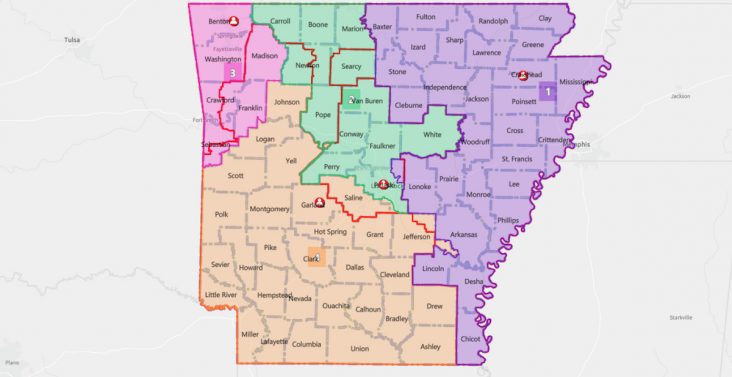Lawmakers search for consensus on Congressional maps
by September 29, 2021 7:14 pm 1,248 views

A proposed Congressional redistricting map presented by Sen. Alan Clark, R-Lonsdale.
The 93rd Arkansas General Assembly reconvened to tackle changing the state’s Congressional districts on Wednesday (Sept. 29), but a consensus did not develop on their first day back at the state capitol.
Charged with redrawing boundaries for Arkansas’ four members of the U.S. House, state Senators and Representatives took different paths on their process, maps and other legislative items. Every 10 years after the U.S. Census, state lawmakers must redraw Congressional District lines to keep population totals within a small percentage of differentiation. For the first time in modern history, Republicans control that process with supermajorities in both legislative chambers.
However, finding a consensus remained elusive on the first day of the effort. During the Senate State Agencies and Governmental Affairs committee meeting, Sen. Breanne Davis, R-Russellville, requested a discussion instead of a vote on her proposal, SB 735. It moved Pope and Cleburne counties into the 2nd Congressional District, while adding more voters in Sebastian County to the 4th District. Pulaski County would also be divided between the 2nd and 4th districts under her plan.
A push against her proposal was made by at least two legislators, Sen. Jane English, R-North Little Rock, and Sen. Mathew Pitsch, R-Fort Smith. Pitsch highlighted that Sebastian County is the fourth largest county in the state and voters in that county do not want to be split up anymore.
“It’s someone else’s turn to be divided because we have been there,” he said.
Davis agreed to alter her bill to reverse the additional move of voters in Sebastian County and said she would move roughly 10,000 voters in Crawford County into the 4th District. The Senate panel adjourned until Thursday morning when it is likely Davis’ new proposal will be presented.
Over in the House State Agencies and Governmental Affairs committee, Chairman Rep. Dwight Tosh, R-Jonesboro, tasked members to pick their top three proposals with the goal to vote on one bill. About an hour later, they met again and picked the following top three in chronological order: HB 1969, HB 1970, and HB 1971.
Rep. Nelda Speaks, R-Mountain Home, proposed HB 1971, which includes the following changes:
- District 1 would gain Boone, Marion and all of Searcy counties, but lose parts of Jefferson County;
- District 2 would lose a portion of Pulaski County;
- District 3 would gain Sebastian and Crawford counties; and
- District 4 would gain Jefferson, Lincoln, Newton and Pope counties
The committee reconvened at 6 pm on Wednesday, but quickly adjourned without a consensus. The House panel will meet again Thursday.
BEYOND REDISTRICTING
When the House and Senate chambers convened on Wednesday morning, they debated whether the legislature could debate bills unrelated to Congressional redistricting. A proclamation that set the parameters for the long recess taken since April has some legislative leaders worried that taking up other matters may be unconstitutional. Gov. Asa Hutchinson has agreed with that assessment.
After a long debate on the Senate floor, senators voted on a motion to block bills unrelated to Congressional redistricting from being assigned to committee or debated. The motion failed with a 16-16 tie. It needed 18 votes for passage.
Later the Senate Public Health, Welfare and Labor committee met to discuss COVID-19 related bills that have been recently filed. All but three bills on the agenda were batched and sent to the Senate floor for debate with no public comment allowed.
Speaker of the House, Matthew Shepherd, R-El Dorado, placed two COVID-19 related bills on a House committee agenda.
The House Public Health, Welfare and Labor committee discussed those two bills. The measures would allow workers to opt out of an employer’s requirement to have a COVID-19 vaccine. It would allow the exemption if workers are tested weekly or can prove they have COVID antibodies.
Editor’s note: Marine Glisovic is a senior political reporter for KATV News.
